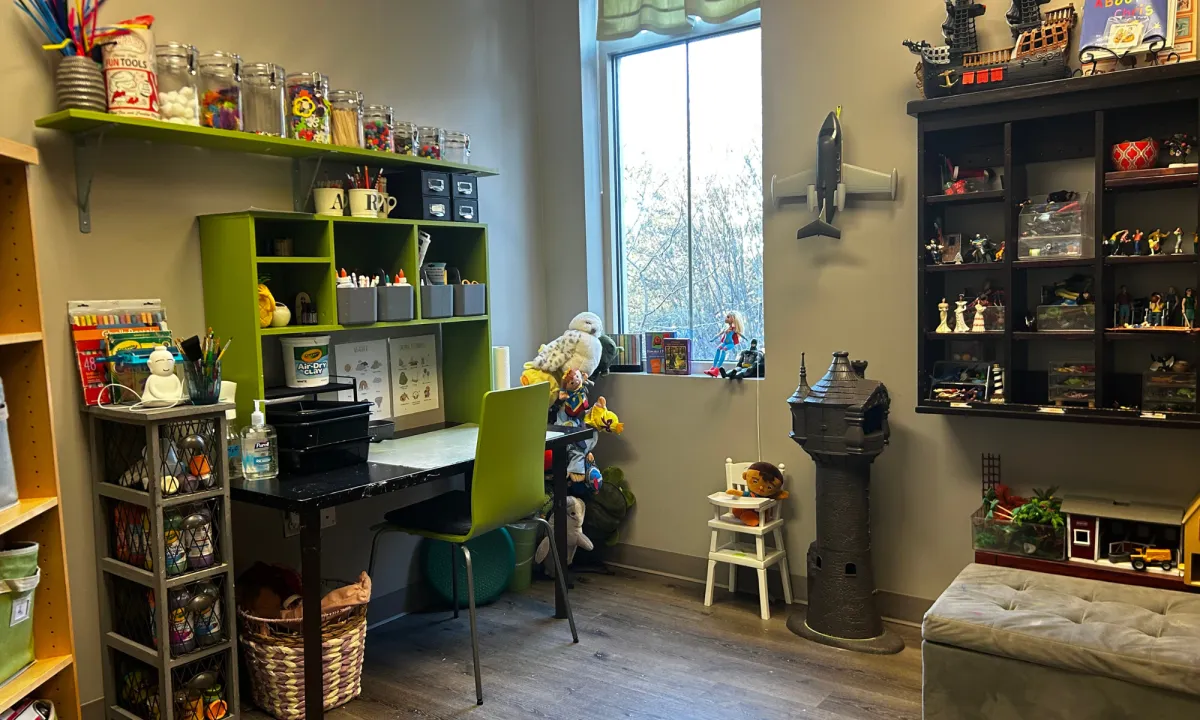Family Therapy Center of Northern Virginia
You Do Not Have to Hold it All Together Here
Life in Northern Virginia moves quickly, and you may be used to carrying a great deal.
You might find yourself tense, disconnected, or unable to fully slow down, even when life looks stable from the outside. If you are a parent, you may be worried about your child or teen and unsure what else to try. There is often little space to pause, even when something feels off.
Located in Lansdowne, Virginia, Family Therapy Center of Northern Virginia (FTC) is a place to slow things down, make sense of what feels stuck, and receive thoughtful, grounded support.
Some people come on their own. Some bring in their children or teens. Others come as couples or partners. However conventionally or unconventionally you arrive, you will be met with care.
Our Location: 19420 Golf Vista Plaza #330, Lansdowne, VA 20176

Who We Support in Therapy
We support individuals and families across the lifespan.
Therapy With Adults
Sound familiar? You are capable, accomplished, and used to handling a great deal. Still, there's a constant edge of tension, a difficulty slowing down, or a sense of disconnection that does not make sense given how stable life appears on the outside.
When stress begins to overwhelm, focus is often harder to sustain, sleep comes and goes, and a constant undercurrent of pressure or irritability makes it difficult to fully settle. How are your relationships? Your emotional presence? Our clients often complain that a fulfilling life feels too far out of reach and they need guidance seeing the pathway forward.
Therapy can help organize the chaos and bring understanding and peace right where it is needed most.
Many of the adults we see like the simplicity and privacy of coming to therapy during the school or workday, using the flexibility they have to finally turn toward themselves. Therapy here offers a steady, private space to slow down, understand long-standing patterns, and receive support.
Therapy With Young Children: Play Therapy, Art Therapy & Parent Support
You may be here because big emotions, behavior changes, or frequent meltdowns are taking over daily life. Transitions feel hard. Sleep is disrupted and even separation might be a struggle. Parents often feel worried, confused, or exhausted, and unsure what else to try.
Play Therapy helps young children express what they cannot yet explain, develop stronger regulation (calm), and feel safer in their bodies. Our playrooms are mindfully and beautifully stocked with the right tools and toys to help your child heal.
We See You Too, Parent: Here at FTC parents are supported with routine messages or parent sessions throughout the process so that you have understanding, guidance, and practical tips to use at home. You're not alone. We will walk the path with you.
Tweens & Teens: Talk Therapy+
Worrying about an older child or teen can be frightening. You may be noticing withdrawal, intense emotions, shutdown, anxiety, irritability, or changes in behavior or grades that feel alarming or out of character, and wondering what is happening internally and how concerned you should be.
Therapy offers your adolescent a safe confidential place to talk, reflect, and feel understood without pressure. Sessions may include conversation, creative activities, Art Therapy or a mixture, depending on what helps them engage.

The Importance of Safety, Identity & Belonging
We are a welcoming and affirming space for LGBTQIA+ youth, adults, and families. We also work thoughtfully with neurodivergent individuals, including those who experience the world differently due to ADHD, autism, learning differences, or sensory sensitivities.
We intentionally support individuals and families impacted by neuroimmune and chronic health conditions, including PANS/PANDAS, with an emphasis on safety, respect, and being truly seen.
Therapy here is paced, respectful, and responsive to who your loved one is, not who they are expected to be.
Couples & Families in Therapy
You may be here because conversations go in circles, conflict escalates too quickly, or
distance has quietly taken hold.
Efforts to fix things on your own have not led to lasting change, and patterns keep repeating
despite good intentions.
You may feel misunderstood, frustrated, or unsure how to repair what feels fragile.
Couples/Family therapy offers a structured, supported space to slow things down, understand
what is happening beneath the surface, and work toward repair.
Sessions may include partners, children, teens, or adult children, depending on what is most helpful.
The focus is restoring connection, improving communication, and creating meaningful change that
can be sustained.
All relationships whether traditional or not are welcome. We strive to be a safe space for LGBTQIA+ as
well as unconventionally blended families, knowing that there is not a one size fits all way a family or relationship looks and feels.
How Therapy Works Here at FTC
People often come to therapy HERE because they are tired of circling the same issues without real change.
We focus on what is actually driving the problem, not on labels or diagnoses.
We are also thoughtful about fit. Taking time to connect you with the right therapist matters, and referrals within our practice are made with care and intention.
If we believe another outside provider or practice would better meet your needs, we will say so and help guide you in that direction.
Getting the right support matters more than keeping someone in our care.

Early in the process, sessions are typically weekly. The rhythm of a week matters. Consistent support allows momentum to build, patterns to surface, and real shifts to take hold both in session and at home.
As things begin to feel steadier and life becomes more manageable, sessions naturally space out.
Our therapists are trained to work with the deeper systems that keep problems in place, not just the symptoms on the surface.
This allows the work to go beyond coping and insight alone, helping change happen at a level that feels lasting rather than temporary.
The pace is thoughtful and intentional. We go deep enough to reach the root of the problem, while staying grounded, steady, and responsive to what feels manageable.
Therapy here is not rushed, formulaic, or one-size-fits-all. It is tailored, relational, and built for meaningful change.
A Practice Rooted in the Community
Family Therapy Center of Northern Virginia is deeply rooted in this area. Many of our licensed therapists trained here, grew professionally here, and chose to stay.
We are also a Training Center for therapists, both within our practice and throughout the USA. This ongoing commitment to continuing education, supervision, and mentorship strengthens the steadiness and depth of the care we provide.
Children are seen by Registered Play Therapists and Registered Art Therapists or those under advanced supervision. Adults are seen by clinicians who are trauma informed, understand development, long-term patterns, and meaningful change. We strive to make therapy at FTC feel sound, supported, and carefully held.
Below are examples of two spaces designed to meet children and teens where they are, quietly supporting the work before a single word is spoken.


Designed to meet children and teens where they are, these spaces quietly support the work before a single word is spoken.
Privacy, Discretion & Insurance
People come to therapy with different levels of visibility in their personal and professional lives.
For some, privacy is simply important. For others, it carries additional personal or professional weight.
We work with many adults whose personal and professional lives require a high level of confidentiality, including those with security clearances, public visibility, or roles where discretion matters deeply.
While every client receives the same careful protection of their confidentiality, we understand that the experience of privacy can feel different depending on one’s circumstances.
Family Therapy Center is a fully private pay practice and does not take insurance. Therefore, insurance companies do not access your therapy chart.
We are thoughtful and deliberate in how clinical information is documented and protected. Confidentiality is foundational to how we work.
Safe Sound Protocol (SSP)

Some individuals and families notice that even when they understand what is happening intellectually, their body remains tense, reactive, or shut down.
Stress may linger, sleep may be disrupted, or it may feel difficult to fully relax, connect, or feel at ease.
The Safe Sound Protocol is a listening-based at home intervention designed to support regulation, connection, and resilience at a nervous system level.
It is safe for children, teens, and adults, and can be especially helpful when talk therapy alone has not shifted long-standing patterns of stress, overwhelm, or disconnection.
SSP may be offered as a stand-alone service or thoughtfully integrated into therapy, depending on your needs and goals.
We will help you determine whether it is a good fit and how it may support your overall well-being.
Getting Started
Beginning therapy does not require a crisis. Often, it begins with noticing that something feels heavy, stuck, or unsustainable.
Family Therapy Center of Northern Virginia is a fully private pay practice and each therapist decides their own fee structure. Payment is due at each session. Superbills are provided at the end of the month for those who wish to seek insurance reimbursement.
If you are considering therapy for yourself, your child, or your family, we invite you to reach out to learn more and take the next step. We can't wait to meet you!
